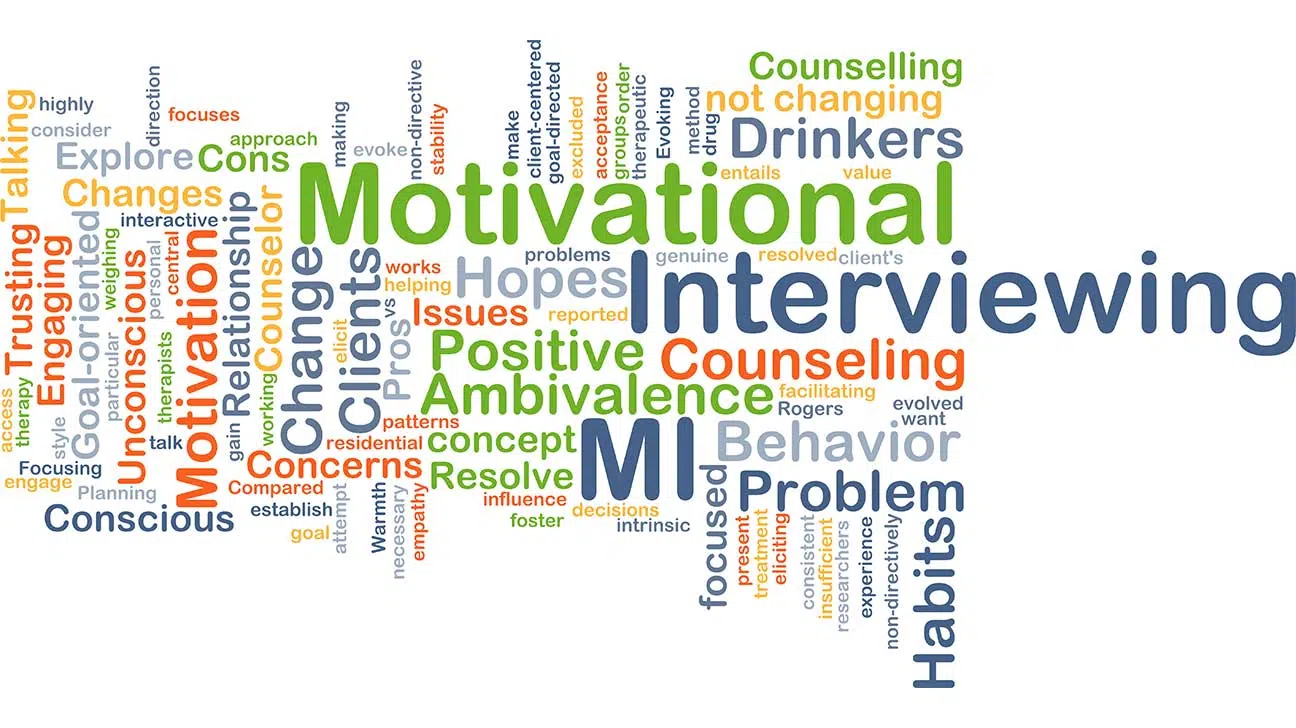Motivational Interviewing (MI) For Addiction Recovery
Motivational interviewing for addiction recovery entails a unique blend of techniques that help people develop autonomy and self-sufficiency in sobriety.

Motivational interviewing (MI) for substance abuse treatment has become one of the most common addiction therapy techniques used by mental health specialists.
This approach is adaptive to a wide spectrum of substance abuse patterns and histories, and is designed to be flexible for different levels of addiction treatment.
Evidence of successful clinical results and outcomes supports the efficacy of motivational interviewing for clients who have difficulty accepting transitions in recovery.
What Is Motivational Interviewing?
Motivational interviewing is a client-centric evidence-based therapy approach that incentivizes behavioral changes and healthier lifestyle choices.
The MI approach focuses on developing a therapeutic alliance between counselors and clients, as they collaboratively work on overcoming personal obstacles to sobriety.
The purpose of this therapeutic technique is to validate a person’s reservations or ambivalence about sobriety by expressing empathy and unconditional positive regard.
The role of the therapist in motivational interviewing is to facilitate the development of the client’s internal motivation to become proactive in recovery.
Principles Of Motivational Interviewing
The techniques and primary principles of MI are based on the theory that motivation to change and commit to sobriety has to develop from within, not by external coercion.
This therapy model is most effective for people who are ambivalent about their recovery and may be averse to changing their behaviors and adapting to a lifestyle of sobriety.
There are five principles of motivational interviewing. These are nuanced styles of communication between the client and their individual therapist.
The five principles of motivational interviewing are:
- express empathy
- avoid confrontation
- roll with resistance
- motivate change
- encourage autonomy
Empathy is critical for building trust, empowering someone to generate self-confidence, and developing effective communication styles in a therapeutic relationship.
Part of substance abuse treatment is healing dysfunctional relationships with self and others, and learning how to rebuild self-esteem and autonomy lost in addiction.
Techniques Of Motivational Interviewing
In motivational interviewing therapy, people learn how to use effective communication skills, and benefit from receiving positive reinforcement for healthy self-expression.
Change talk is a communication technique that mobilizes people to participate in action-oriented conversations, and set healthy intentions in sobriety.
Change talk is elicited with prompts known by the acronym OARS, which teach people the essential communication skills and strategies for constructive dialogue.
The four key communication skills of OARS are the following:
- open-ended questions
- affirmations
- reflective listening
- summarizing
The communication structure of change talk and OARS is designed to elicit in-depth exploration of a person’s authentic desire, ability, reasons, and need for change.
Stages Of Change In Motivational Interviewing
The stages of change or transtheoretical model is part of the motivational approach. This is an alternative to confrontational approaches that can provoke resistance and adversity.
The stages of motivational interviewing are designed to be cyclical and sequential, and flexible enough that they can be individualized for optimal success in treatment.
The stages of change model include:
- precontemplation
- contemplation
- preparation
- action
- maintenance
Each stage represents the mindset of a person as they gradually approach self-acceptance and the realization that sobriety can help them achieve their goals.
Precontemplation and contemplation entail coming to terms with the consequences of addiction, with the encouragement of unconditional positive regard from a therapist.
Once someone moves into preparation and action, they become more self-aware and motivated to set intentions for themselves as their perspective on sobriety evolves.
The maintenance phase focuses on the continuity of healthy behaviors and thoughts. This is an ongoing process of staying in the present, sustaining positive recovery, and dealing with relapse.
Is Motivational Interviewing Really Effective?
Motivational interviewing is most effective for people who are resistant to traditional inpatient rehab counseling methods.
Some of these methods include:
- cognitive behavioral therapy
- dialectical behavior therapy
- family therapy
While the technique was originally designed to treat alcohol addiction, it has become a widely used intervention strategy known for its efficacy in treating various addictions.
The potential benefits of MI result from the increased autonomy and self-confidence that clients develop, which empowers them to change voluntarily, instead of by force.
Research on MI indicates that people who are more engaged in therapy are more favorably responsive to treatment and receptive to clinical recommendations.
Finding Treatment For Addiction
Recovering from an addiction is a long and challenging journey that requires self-acceptance and willingness to embrace change in many aspects of life.
If a loved one or someone you know is in need of treatment to overcome an addiction, the right therapy approach is a paramount factor in achieving success in recovery.
At Spring Hill Recovery Center, we provide a variety of evidence-based treatment approaches that can be individualized to meet the needs of anyone who seeks recovery.
Reach out to our rehab center in New England to learn more about the specialized treatment options that are available to help people discover a life free of addiction.
- Frontiers in Psychiatry – Attachment and Therapeutic Alliance https://www.frontiersin.org/articles/10.3389/fpsyt.2021.730876/full
- Institute for Research, Education, & Training in Addiction – Eliciting Change Talk https://ireta.org/eliciting-change-talk-infusing-motivational-interviewing-with-intentionality/
- Medscape – Motivating Health Behavior Change in Clinical Settings https://www.medscape.org/viewarticle/541417
- National Institute on Drug Abuse – Motivational Enhancement Therapy https://nida.nih.gov/publications/principles-drug-addiction-treatment-research-based-guide-third-edition/evidence-based-approaches-to-drug-addiction-treatment/behavioral-therapies/motivational-enhancement-therapy
- National Library of Medicine – Motivational Interviewing https://www.ncbi.nlm.nih.gov/pmc/articles/PMC1463134/#:~:text=Motivational%20interviewing%20had%20a%20significant,and%20psychological%20(75%25)%20diseases.
- Positive Psychology – Is Motivational Interviewing Effective? https://positivepsychology.com/motivational-interviewing-effectiveness/
- Providers Clinical Support System – Motivational Interviewing https://pcssnow.org/resource/motivational-interviewing-talking-with-someone-struggling-with-oud/


